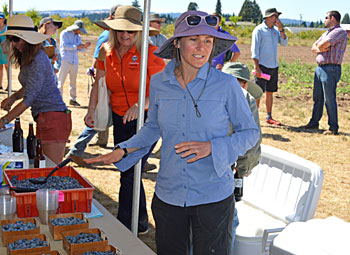Blueberries Get Full-Time Breeder
The Northwest blueberry industry welcomed its first full-time blueberry breeder this past June when Claire Luby, a research geneticist, joined the USDA-ARS Horticultural Crops Research Unit in conjunction with the Northwest Center for Small Fruits Research.
Luby comes to the center with a Ph.D. in plant breeding from the University of Wisconsin-Madison.
“Claire has an extensive background in plant breeding, including work on carrots and hazelnuts,” said Inga Zasada, the center’s research leader. “She has hit the ground running.”
 |
Research geneticist Claire Luby, pictured at the Oregon Blueberry Field Day in July, has joined the USDA-ARS Horticultural Crops Research Unit in Corvallis as the industry's first full-time blueberry breeder. |
Since joining the unit in June, Luby has been participating in national breeding efforts to increase genotyping and phenotyping platforms for blueberries, Zasada said. And she has worked to get up to speed on the breeding program that research geneticist Chad Finn left behind. Finn, who died while on vacation in Hawaii in December of 2019, left behind a considerable amount of material, Zasada said.
One potential focus of her breeding efforts will be to develop varieties that are more heat tolerant, Zasada said. “Is there material in the USDA breeding program that might be more heat tolerant is a question that she has told me she is interested in,” Zasada said.
Also, this past spring, the USDA-ARS brought on Dimitre Mollov, a plant pathologist who will work in blueberries, as well as other small fruits. “He is going to continue to pursue virus problems in blueberry, whether that is old or new virus issues,” Zasada said. “There are some ongoing projects that were left behind by (retired ARS plant pathologist) Bob Martin that Dimitre will pursue.”
The USDA-ARS also is looking to bring on two additional scientists in coming months, including one whose focus will be weed management in small fruits who will be based in Prosser, Washington.
“There is a lack of expertise in weed science, and it is certainly something blueberry growers struggle with,” Zasada said. “I suspect at least half the person’s program might be in weed management in blueberry on the east side, as well as on the west side in Oregon and Washington.”
In other news from the Northwest Center for Small Fruits Research, the center announced earlier this year that Chad Finn was inducted into the USDA Agricultural Research Service Science Hall of Fame.
“That is the highest honor that can be bestowed on an ARS scientist,” Zasada said. “I think what kind of propelled Chad into that was that he was just prolific in his releases. He had something like 57 varieties over the course of his career, and I think part of why he was recognized is because of his incredible output.”
Zasada added that Finn in fact was instrumental in the creation of Luby’s position.
“He recognized the need for a blueberry breeder,” Zasada said. “He also recognized that he was spreading his program too thin by concentrating on multiple things. So, having a blueberry breeder that can exclusively focus on blueberries and another breeder that can exclusively focus on caneberries is part of the vision that Chad had for the program.”
The USDA-ARS also this past spring brought on Michael Hardigan, a research geneticist who will focus on caneberries.